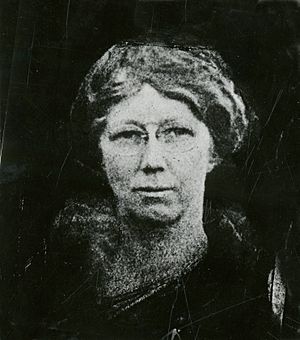Edna H. Fawcett facts for kids
Quick facts for kids
Edna H. Fawcett
|
|
|---|---|

Picture of Fawcett during her time in Department of Agriculture. Exact date unknown.
|
|
| Born | 1879 |
| Died | 1960 |
| Alma mater | Smith College, Barnard College |
| Occupation | Botanist, Pedologist, Pathologist |
| Known for | Stabilization of Boric Acid Buffers By Aeration The Problem of Dilution in Colorimetric H-Ion Measurements |
| Scientific career | |
| Institutions | New York Botanical Garden, United States Department of Agriculture |
Edna Hague Fawcett (1879 – 1960) was an American botanist. This means she was a scientist who studied plants. She was also an expert in plant health problems.
Early Life and Education
Edna Fawcett was born in 1879. She loved learning about science. She went to Smith College and earned her bachelor's degree in 1901. After that, she continued her studies at Barnard College.
Career in Plant Science
After college, Fawcett worked at the New York Botanical Garden. This is a famous place where scientists study plants. In 1906, she joined the Bureau of Plant Industry. This was part of the United States Department of Agriculture (USDA). She started as a technician, helping with experiments. Over time, she worked her way up. By 1930, she became an assistant pathologist. A pathologist is a scientist who studies diseases. In her case, she studied diseases that affect plants.
Important Studies
Edna Fawcett wrote several important scientific papers. Two of her most well-known studies were:
- Stabilization of Boric Acid Buffers By Aeration
- The Problem of Dilution in Colorimetric H-Ion Measurements
She wrote both of these studies with another scientist, S. F. Acree. These papers helped other scientists with their research.
See also
- In Spanish: Edna H. Fawcett para niños
 | Dorothy Vaughan |
 | Charles Henry Turner |
 | Hildrus Poindexter |
 | Henry Cecil McBay |

